As the world grapples with a slew of challenges—yet another terrorist attack in Istanbul, the British public’s decision to leave the European Union, the greatest migration crisis it has ever known, and inadequate systems of governance to address such transnational dangers—three core themes come to the fore: justice, security, and rule of law.
Lloyd Axworthy, a former foreign minister of Canada, unpacked these complex and interconnected issues at the second annual Madeleine K. Albright Lecture on Global Justice. Highlighting Secretary Albright’s many contributions to advancing the concept of the Responsibility to Protect and the role of democratic institutions in assuring peace, Axworthy knit together seemingly disparate challenges facing the world today and offered a framework for addressing them couched firmly in the respect for basic human rights.
A key pillar of this framework is responsible sovereignty and its offspring, the Responsibility to Protect (R2P)—a now politically fraught concept originally proposed by Francis Deng as a means of providing international protection for internally displaced persons. Axworthy noted the parallels between persons displaced by the Balkans conflict and today’s reality where 65 million people are displaced worldwide. Secretary Albright has made a critical contribution to strengthening R2P as a guide for anticipating and responding to the threat of atrocities, emphasizing R2P’s role as a protective action and not just a humanitarian response. As Axworthy noted, actors in Africa and Southeast Asia are increasingly applying the concept to local conditions.
Given the contentious fallout, however, from the Libya intervention and its perceived metamorphosis into a campaign for regime change, Axworthy emphasized that R2P is primarily a principle of prevention, rather than military intervention. Smart phones and other information and communications technologies are critical new tools for identifying and documenting problems in their earliest stages so they might be addressed by the proper stakeholders before they result in violence. Axworthy suggested that these early warning tools offer a new framework for the international community’s conception of what interventions should look like. This sort of atrocity prevention which engages local communities is yet another one of Secretary Albright’s legacies.
As Axworthy noted, one of the oldest documented human rights—which has precedent in Greek and Hebrew systems of governance—is the right of sanctuary. Though it hasn’t been raised in the complex debates surrounding migration and the refugee crisis, the concept of sanctuary is the simplest distillation of the imperative facing governments. “A right is something you defend because it can happen to you.” Anyone could find themselves a refugee; governments should behave accordingly when fashioning migration policies.
“A right is something you defend because it can happen to you.” Anyone could find themselves a refugee; governments should behave accordingly when fashioning migration policies.
In that vein, Axworthy recalled the fluid coalitions of like-minded stakeholders who worked together on such issues as the elimination of land mines. Those stakeholder groups—nation states, the International Committee of the Red Cross, international civil society coalitions, writers and academics, and popular leaders like Princess Diana—understood how threats in seemingly distant locales could affect them and worked to develop a popular intervention. It is this core belief—that human rights must be protected for the benefit of all—which must be fostered more broadly in the international community and underpin policy approaches to successfully address the migration crisis. “The risk inherent in the migration crisis could be corrosive and could create a series of explosions which could tear our infrastructure and rules apart,” Axworthy strongly asserted. The risk is real. Relevant stakeholders must do more to influence public opinion and generate political will in other ways in support of effectively addressing the migration crisis with respect for human rights.
At the same time, governments cannot act independently of popular will and still be considered legitimate. Sovereignty rests on the will of the people as expressed through regular and genuine elections of representatives who are obliged to protect the human rights of the entire population. Maintaining a close connection to the people with open lines of communication about policies and priorities is critical to avoiding having large swathes of the public feeling alienated and vulnerable to divisive political rhetoric. Britain seems to have failed in this regard as evidenced by the outcome of the recent referendum on membership in the European Union; the United States is on a similar path leading up to the November presidential elections between presumptive nominees Hillary Clinton and Donald Trump. Too often governments are not listening to their people, Axworthy asserted. We are seeing this play out in many arenas, not least in the global backsliding in the quality of democracy and respect for human rights.
“The risk inherent in the migration crisis could be corrosive and could create a series of explosions which could tear our infrastructure and rules apart.”
There is a constellation of potential solutions to the challenges of our day that don’t fit into the standard conception of global governance, Axworthy summarized. Just as the concept of sovereignty has evolved over time to incorporate responsibilities to protect the security and human rights of populations, so too must our concept of governance. Our greatest contemporary challenge—the migration crisis as driven by conflict, constrained resources, and the impact of climate change—lacks a clear governance framework. But we can build on Secretary Albright’s example as a refugee who became a leader on atrocity prevention, protection of threatened populations, and support for democratic institutions, to forge a more just, secure, and peaceful future.
The Madeleine K. Albright Global Justice Lecture hosted in The Hague and the Justice Stephen Breyer Lecture on International Law hosted in Washington, D.C. are products of a partnership between the Brookings Institution and The Hague Institute for Global Justice to explore contemporary challenges in global affairs at the nexus of justice and security. The annual Madeleine K. Albright Lecture was inaugurated in The Hague in 2015 and continued in 2016. The annual Justice Stephen Breyer Lecture was inaugurated in Washington, D.C. in 2014 and continued in 2015 and 2016.
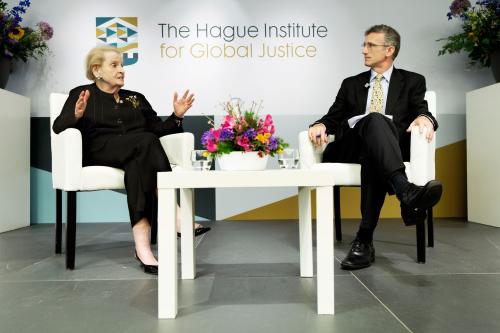
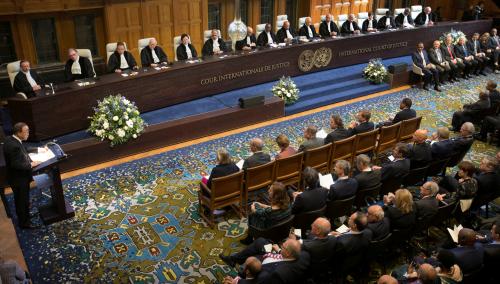
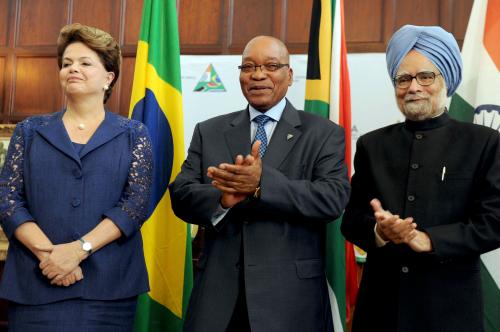
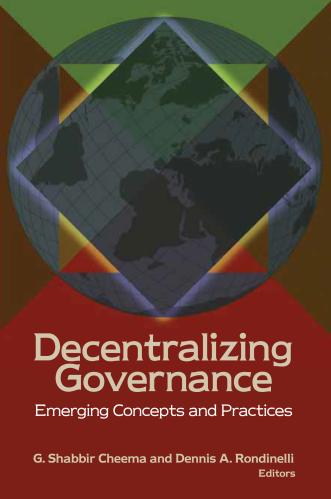
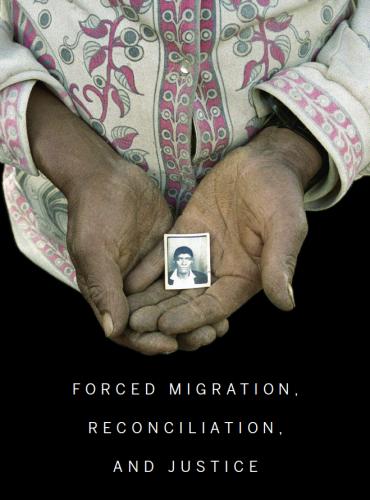





Commentary
Towards a more just, secure, and peaceful world: Lessons from Albright and Axworthy
July 5, 2016